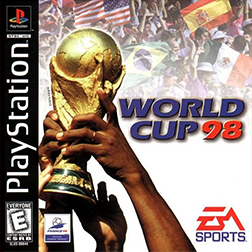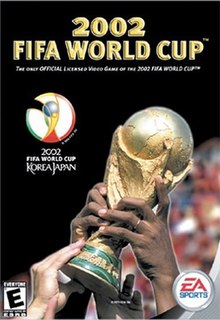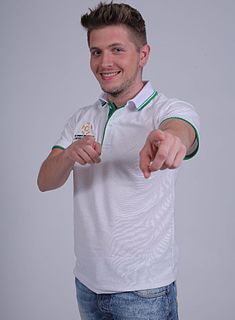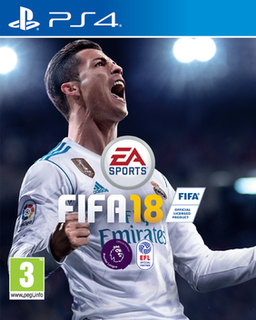
The France national football team represents France in men's international football and is controlled by the French Football Federation, also known as FFF, or in French: Fédération française de football. The team's colours are blue, white and red, and the coq gaulois its symbol. France are colloquially known as Les Bleus. They are the reigning world champions, having won the most recent World Cup final in 2018.

FIFA is a series of association football video games developed and released annually by Electronic Arts under the EA Sports label. As of 2011, the FIFA franchise has been localised into 18 languages and available in 51 countries. Listed in Guinness World Records as the best-selling sports video game franchise in the world, the FIFA series has sold over 325 million copies As of 2021. It is also one of the best-selling video game franchises.

The Confederation of African Football or CAF is the administrative and controlling body for African association football.
The UEFA Champions League video game license has been used by four different companies, with a surprising irregularity, given the competitions' fan-base and popularity. Debuted in 1996, the series has only had five games published so far, and after being in the hands of Krisalis Software, Silicon Dreams Studio and Konami, the license now lies in the hands of EA.
FIFA has licensed FIFA World Cup video games since 1986, of which only a few were received positively by the critics, but given the popularity of the competition, they all did positively on the market, and the license is one of the most sought-after. Originally in the hands of U.S. Gold, Electronic Arts acquired it in 1997 and is the current holder.

World Cup 98 is the first official FIFA World Cup game developed by EA Sports after obtaining the rights from FIFA in 1997. Unlike the previous World Cup games, which were in 2D and showed a bird's-eye view, World Cup 98 used a 3D engine, utilising DirectX for the PC version. Accurate national team kits were introduced complete with kit manufacturer logos and official merchandise. The game engine is based on that of FIFA: Road to World Cup 98, though it features some minor gameplay improvements to areas such as in-game strategy changing and player positioning. The playable teams in the friendly mode also included several nations that did not qualify for the finals. World Cup 98 was released for Microsoft Windows, PlayStation, Nintendo 64 and Game Boy.

2002 FIFA World Cup, sometimes known as FIFA World Cup 2002, is the second EA Sports official World Cup video game and tie-in to the 2002 FIFA World Cup, released for GameCube, Microsoft Windows, PlayStation, PlayStation 2 and Xbox. It was developed by EA Canada and Creations, with Intelligent Games assisting the development of the PC and sixth-generation console versions, with additional assistance from Tose Software for the GameCube version. The game was published by EA Sports in North America and Europe and published by Electronic Arts Victor in Japan. The GameCube version is a launch title for the system in Europe.

FIFA 08 is the 2007 installment of EA Sports' series of football video games. Developed by EA Canada, it is published by Electronic Arts worldwide under the EA Sports label. It was released on all popular gaming formats in September 2007 in Europe, Australia, and Asia, and in October 2007 in North America. The PlayStation 3 and Xbox 360 versions of the game feature an improved game engine with superior graphics and different commentators and are dubbed "next-generation" by EA. On all other platforms—including the PC—the game utilizes an older engine. The Nintendo DS version features fewer teams, stadiums, game modes and kits due to the limitations of the machine's storage medium.

The PlayStation 2 (PS2) is a home video game console developed and marketed by Sony Computer Entertainment. It was first released in Japan on March 4, 2000, in North America on October 26, 2000, in Europe on November 24, 2000, and in Australia on November 30, 2000. It is the successor to the original PlayStation, as well as the second installment in the PlayStation console line-up. A sixth-generation console, it competed with Sega's Dreamcast, Nintendo's GameCube, and Microsoft's original Xbox.

FIFA 09 is the 2008 installment of Electronic Arts' FIFA series of football video games. Developed by EA Canada, it is published by Electronic Arts worldwide under the EA Sports label. It was released in October 2008 for Microsoft Windows, Nintendo DS, PlayStation 2, PlayStation 3, PlayStation Portable, Wii, Xbox 360 and Zeebo. It was later in November 2008 released for the N-Gage 2.0 and Mobile phone.

FIFA 11, also known in North America as FIFA Soccer 11, is the 18th title in Electronic Arts' FIFA series of football video games. Developed by EA Canada, it was published by Electronic Arts worldwide under the EA Sports label. It was released on 28 September 2010 in North America, 30 September 2010 in Australia, and 1 October 2010 in Europe for all platforms, except the Wii and Nintendo DS. The Wii version was released on 1 October 2010 in North America and Europe and the DS version on 8 October 2010. The PC version of FIFA 11 is the first in the series to use the same game engine as the PlayStation 3 and Xbox 360 versions. The game received positive reviews, and was awarded 'Sports Game of the Year' at the Golden Joystick Awards after a record-breaking 2.05 million votes. This was the last FIFA title to be released for the Nintendo DS.

Pro Evolution Soccer 2014 is an association football video game developed and published by Konami for Microsoft Windows, Nintendo 3DS, PlayStation 2, PlayStation 3, PlayStation Portable, and Xbox 360 in 2013. The European cover art for the game was the first in the series not to feature a football player since Pro Evolution Soccer 3 was released in 2003. PES 2014 was succeeded by Pro Evolution Soccer 2015.
The association football tournament at the 2020 Summer Olympics is scheduled to be held from 21 July to 7 August 2021 in Japan.

2014 FIFA World Cup Brazil is the official video game for the 2014 FIFA World Cup, published by EA Sports for PlayStation 3 and Xbox 360. It was released on 15 April 2014 in North America, and 17 April 2014 in Europe, as was the case with the 2010 edition.

Ivan Lapanje, better known as BorasLegend, is a Swedish competitive FIFA player and currently ranked number one in Sweden. He won the Las Vegas World Challenge Series in 2013 and is a multiple Swedish Champion. He is the top competitive earner of the FIFA video game series and widely regarded as one of the greatest FIFA players in history.

Michael LaBelle, is a web-based entertainer, video producer, and a professional FIFA player for New York Red Bulls, previously known by the pseudonyms michs09 and Dirty Mike. He is known mostly for providing tips via nontraditional methods through YouTube and Twitch outlets.

FIFA 18 is a football simulation video game in the FIFA series, developed and published by Electronic Arts and was released worldwide on 29 September 2017 for Microsoft Windows, PlayStation 3, PlayStation 4, Xbox 360, Xbox One and Nintendo Switch. It is the 25th installment in the FIFA series. Portuguese footballer Cristiano Ronaldo, at the time contracted to Real Madrid appears as the cover athlete of the regular edition, as well as the alternate covers of the Icon and 2018 FIFA World Cup editions of the game.

FIFA 19 is a football simulation video game developed by EA Vancouver as part of Electronic Arts' FIFA series. It is the 26th installment in the FIFA series, and was released on 28 September 2018 for PlayStation 3, PlayStation 4, Xbox 360, Xbox One, Nintendo Switch, and Microsoft Windows.


















